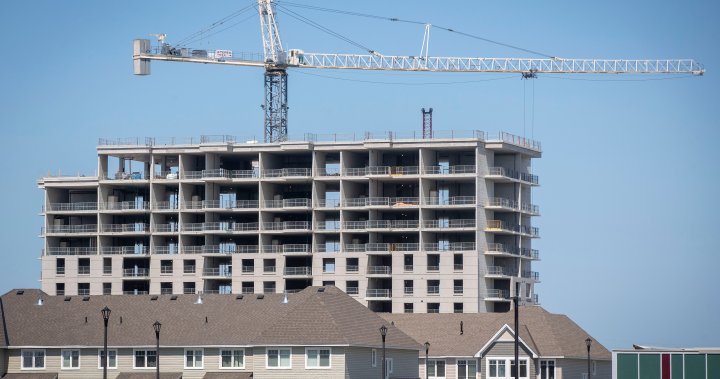The federal government is removing the GST on the construction of new rental apartment buildings, Prime Minister Justin Trudeau announced on Thursday.
The news came one day after Housing Minister Sean Fraser signalled Wednesday that the government is exploring avenues to lower costs for builders due to the current high interest rates from the Bank of Canada.
Trudeau said he was encouraging all provinces and territories to also work towards eliminating the GST on rental builds.
“More and more Canadians are renting and the cost of rent keeps going up,” Trudeau said. “Canadians need more buildings intended for renters, not just condos that turn into AirBnbs or sold to foreign buyers as financial assets.”
He added the plan would ensure more apartments were built in small towns and big cities, and “especially” along transit lines.
The Canadian Home Builders’ Association said the government’s action addressed a “long-standing issue” that has prevented construction of more rental housing.
Chief executive officer Kevin Lee said it was something they had called for for a long time and would be necessary for “many years to come” to ensure more rental housing is built.
Through the Liberal caucus retreat in London, Ont., the government has said that it will be announcing measures aimed at easing the current housing crisis.
On Wednesday, it announced that London is the first city to receive money from the Housing Accelerator Fund. That city is receiving $74 million over the next three years to help build 2,000 units.

Conservative Leader Pierre Poilievre criticized the Housing Accelerator Fund, calling it Justin Trudeau’s “photo-op fund.” Poilievre said he would introduce a new bill in the House of Commons with his own proposals to address the housing crisis when the fall session returns.
“It will require cities permit 15 per cent more homebuilding per year or lose federal grants. Those that build more than 15 per cent in extra home building will get a building bonus,” he said in a press release.
“This will be based on a strict mathematical formula. If you exceed your building target by one per cent, your funding goes up one per cent. If you missed your target by one per cent, your target goes down one per cent. More homebuilding, more money, less homebuilding, less money.”
Poilievre said the plan would reduce taxes and red tape, prioritize housing near transit stations, and bring a NIMBYism (Not In My Backyard) penalty for municipalities that block development.
Poilievre’s proposed legislation is in line with his housing promises to voters, should the Conservatives form the next government.
The Ontario Real Estate Association’s chief executive officer Tim Hudak, who is also the former leader of Ontario’s Progressive Conservative party, praised Poilievre’s plan, calling it “exactly what we need.”
Pressed Thursday on why Trudeau was renewing his plan to end the GST on rental housing six years after the Liberals dropped their 2015 campaign pledge to do so, the prime minister said at the time building the Rental Construction Financing Initiative was the better way of “getting things done.”
In 2017, the government said research showed there were better ways to boost supply of affordable housing.

“It was the right program at the time and that’s exactly what we did and it continues,” he said. “But now, given interest rates where they are, given the challenges people have in building apartment buildings, we realize it’s the right time to step up with removing the federal GST on purpose-built apartment buildings.”
Trudeau said they had already heard from a number of provinces that would eliminate their own taxes eliminated from apartment building constructions.
His latest housing-related announcement comes as the Liberals continue to trail the Conservatives in the polls by double digits, but Trudeau balked at questioning over delays of actions that should have taken place sooner.
“The housing crisis requires everyone to work together,” he said. “Having these conversations and making sure we’re building the right solutions for Canadians right now is what Canadians expect of an evidence-based government.”
Fraser also defended the recent announcements by the Liberals, saying that with circumstances having changed compared to when both the GST and Housing Accelerator Fund were both announced.
“There’s been factors that have shifted over the course of the pandemic and since that have made it more expensive to build the kinds of homes that people can actually afford,” he said. “By actually moving forward with removing the federal GST at this point and time, we’re going to change the equation and it’s going to grow supply immensely across this country.”

Fraser said he had received calls from the housing ministers of Ontario, Newfoundland and Labrador and B.C. who each said they too would be removing such taxes.
He said they could not put a number on how many homes would be constructed, but his expectation would be “many thousands of homes” that would come from the elimination of the GST.
The prime minister said there was more announcements to come on housing, though did not specify what, only saying there is no “one simple solution.”
“Housing is a massive challenge and even a crisis, but it’s a crisis that Canada has solved before and it’s one that we’re going to solve again by working together,” Trudeau said.
But even as Trudeau’s government looks to crack down on the housing crisis with making more rental homes able to be built, he will still face difficulty with affordability as the country appears to be falling short on home builds. The Canadian Mortgage and Housing Corporation projected on Thursday the country will still be short 3.45 million homes by 2030.
The shortfall would come down significantly if the country sees lower-than-expected economic growth and current immigration policies end in 2025, but it would still be short 3.1 million units.
— with files from Global News’ Mackenzie Gray and Uday Rana
© 2023 Global News, a division of Corus Entertainment Inc.


